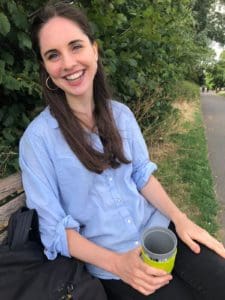Using Positive Deviance to Build Peace. Member Spotlight: Grace Burgess
Grace Burgess has had an eclectic career, living in Russia, the United Kingdom, and Palestine at different points. She has worked largely in the non-profit sector, both on the ground and from more of an infrastructural viewpoint. Grace is passionate about helping people build connections, as evidenced through her volunteer work at TimePeace, an organization that works to integrate people seeking sanctuary in the United Kingdom into their new communities.
International Education

While she was in university, Grace studied political science and Russian, and had the opportunity to live in Moscow as part of her studies. She also visited Israel and Palestine while in university, which sparked her interest in peacebuilding. After she graduated, Grace moved back to Moscow and worked for the Irish embassy in imports and exports. In this role, she oversaw the Joint Economic Commission and worked to improve economic cooperation between the two countries. After returning to the United Kingdom for a few months, she moved to Palestine as an intern for UNICEF. She later became a consultant for the organization, looking after the development of a global platform called Generation Unlimited.
Additionally, she worked with Palestinian Vision to facilitate a non-violence project with teenage boys in the West Bank. In this program, she helped use the behavioral change theory of positive deviance. Positive deviance is the idea that for every problem, someone already has a solution that can be found and implemented, rather than putting resources into research to find a solution.
Work at Home
After completing her work in Palestine, Grace returned to the UK again to be closer to her family. In London, she began working for the National Council for Voluntary Organizations (NCVO), which supports the voluntary sector by providing infrastructure to charities. In this new role, Grace oversaw the organization’s corporate partnerships. At the same time, she was volunteering for an organization called TimePeace, which connects people seeking sanctuary in the UK with local communities. This work is crucial, she explains, in a system that is not set up to allow people to make connections. “When you come to the UK as a person seeking sanctuary, it’s really hard to actually meet people outside of formal support. You’ll have organizations where you can go for activities or therapy or to get clothes or food, training, mentoring, or educational opportunities. But it’s really hard for anyone who moves countries to go somewhere and build up your network.” When the pandemic began in 2020, the organization moved all of its activities online and began running six to seven online events each week. Because of this, TimePeace now has a thriving online community that communicates through Slack even as they begin to reintroduce in-person events. As TimePeace grew and received funding, Grace went part-time in her role at NCVO and assumed the position of Head of Community at TimePeace. Unfortunately, the organization’s funding was later reduced, and Grace returned to working with TimePeace on a voluntary basis. Since then, she has left her job at NCVO, and is now doing temporary work for different charities and has plans to move to Hong Kong in January.
People Person
Grace cites working with people as her favorite part of her work, and she has been able to engage in it frequently during her time at TimePeace. Though TimePeace does not technically work in peacebuilding, their mission is forging connections between people and integrating isolated groups. Asylum seekers in the UK are placed in housing by the Home Office and often moved around the country without notice,; asylum seekers are not allowed to work and given very limited funding, all of which restrict their ability to become familiar with their new communities and make connections with others. Grace loves bringing people together and helping them find common ground to make people’s transitions to life in the UK easier. One way that TimePeace does this is through their “speed friending” events, which operates like speed dating in a non-romantic sense. Back when the organization was able to run these events in-person, Grace describes the atmosphere shift that would occur once people started to get to know each other. “It would feel like you were in a different group of people. From the people that first arrived, who were a little bit shy and awkward, to by the end of the evening you had fifty to seventy people sitting around, sharing a meal, talking non-stop, can’t get them to leave, with everyone feeling super happy.” The work that Grace has done in helping people make connections to one another is invaluable, and has surely made significant impacts on the lives of those involved in the program. For Grace, “the foundation of peacebuilding is creating mutual understanding and ensuring that communities are integrated and cohesive,” which she has undoubtedly helped in doing throughout her career.
Article by Tess Hargarten, MBBI Writer
